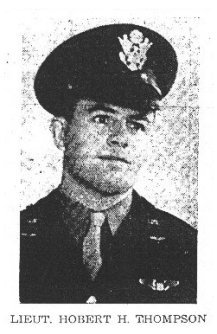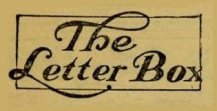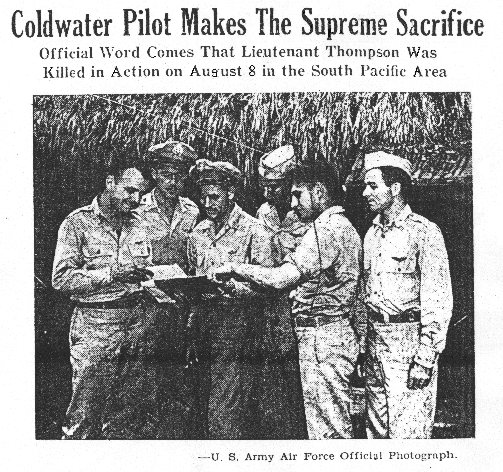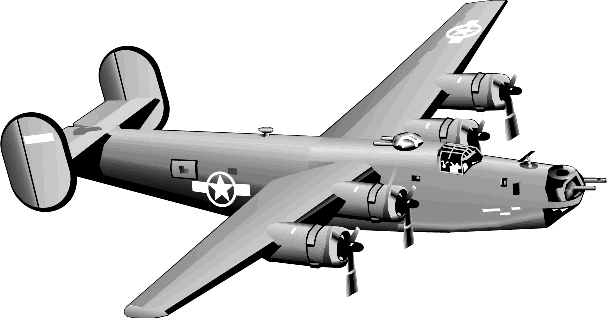Hobert Harvey Thompson Hobert H. Thompson, First Lieutenant, U.S. Army, 0-727585, Killed In Action August 8, 1943. Hobert H. Thompson, First Lieutenant, U.S. Army, 0-727585, Killed In Action August 8, 1943.
At right: photo of First Lieutenant Hobert H. Thompson, USAAF, in uniform. He was the son of Harvey and Mary (Booth) Thompson and the brother of Floyd Thompson. "Hobert, their youngest son, joined the Air Force in 1942 and and was sent to the South Pacific. In August of 1943, Joe Harkleroad came to the ranch with the dreaded telegram from the War Department, stating Hobert was missing in action. This was followed shortly by another telegram saying he had been killed in action." -- Lorraine Thompson, CCH, p. 711.
Hobert H. Thompson is buried in Crown Hill Cemetery, Coldwater, Kansas.
 The Western Star, The Western Star,
'The Letter Box',
February 26, 1943.
The following extracts are from a letter written by Hobert Thompson, somewhere overseas, to his parents, Mr. and Mrs. Harve Thompson:
"Have seen quite a lot of the country now, but all I've seen has been very much alike, mostly rolling land with trees scattered over the land. Saw very little plowed land, but some cotton and cane. The grass land has a heavy growth, and stays green all the year around except for dry periods. They bark the trees to kill them and make the grass better. Was talking to a man on the train, and he said the three year old steers usually weigh about 600 pounds. Most of the cattle are whitefaces, but pretty fine boned. Don't see why a good grade of cattle wouldn't do well here. Seems like the country is about 10 or 20 years behind the times. The business places around town are pretty poor and the restaurants not as clean as they should be, but am told I haven't seen the best part of Australia yet. Have quite a time trying to understand some of the Aussies, but others talk quite plainly. The most noticeable thing about the people is the large number wearing false teeth. Lots of boys and girls who don't look to be over 21 or 22 years old, with a complete upper or lower or both, and the majority have very poor teeth---some say due to lack of minerals in the water, and some think it is a lack of care. The weather where I am now is much like it is there in June or a little later---this being summer over here, but the winter months even in southern Australia only last about two months, and it seldom frosts they say. Saw only a couple of pelicans on the way here and haven't seen any kangaroos as of yet. Got a kick out of the people in the small towns along the way coming out to meet the train. My present address won't last long I think, so my mail will probably be a long time in catching up--probably three months. From a letter of January 26, we quote: "Went fishing yesterday, but didn't have any luck, but saw some wild horses on the way back here." (OHCC)
The Western Star, August 27, 1943:
LT. HOBERT THOMPSON IS MISSING IN ACTION
Was The Co-pilot of B-24 Liberator Bomber in Pacific.The people of Coldwater and surrounding community were deeply grieved to learn Tuesday afternoon of this week that First Lieutenant Hobert H. Thompson, son of Mr. and Mrs. Harvey W. Thompson of Coldwater, was reported by the War Department as missing in action. The following telegram was received by the parents on Tuesday:"Washington, D. C., August 32 (sic - typographical error in newspaper) I regret to inform you a report received states your son, First Lieutenant Hobert H. Thompson, missing in action near Port Moresby, New Guinea, since eighth of August. If further details or other information of his status are received, you will be promptly notified. Ulio, the Adjutant General." Lieut. Thompson was born at Harris, Sullivan County, Missouri, February 2, 1919, and at the time he was reported missing in action was 24 years, six months and six days of age. He came with his parents and one brother, Floyd, to Comanche county in March, 1926, the Thompsons making their home on the former P. A. Johnston ranch three miles west of Coldwater. Hobert attended the Coldwater schools, graduating from Coldwater high school with the class of 1932. He attended the Kansas State Agriculture College in Manhattan two years, then decided to invest in registered cattle, it being his life's desire to be a cattleman on the ranch where he lived. But the coming of war changed his plans. On June 2, 1941, Hobert returned to Manhattan for a special course in drafting and engineering and after completing the course he was employed as a draftsman at the Lockheed airplane factory in Los Angeles, Calif., for several months. On December 30, 1941, shortly after the cowardly Pearl Harbor attack, Hobert enlisted in the army air corps and was sent to Bakersfield, Calif., and later to Tulare and Merced, Calif., for training as a pilot.From there he went to Luke Field, Phoenix, Ariz., for an advanced course in pilot training. There he was selected as one of the five army pilots in the top flight . On July 26, 1942, he received his army pilot's "wings" and the commission of Second Lieutenant in the Air Corps.Without any leave to go home, he was given further intensive training and on August 23 was sent to the Hawaiian Islands for more training. After four and one half months of combat training, Lieut. Thompson left by Clipper plane for Australia. He was also in the Fiji Islands and took part in many engagements in the South Pacific and for some time had been stationed at New Guinea. Lieut. Thompson was one of the American fliers who sank all 22 of the Jap invasion fleet in the Battle of the Bismarck Sea, the most stinging defeat the Japanese had yet suffered. Not an enemy ship, including thousands of Japanese soldiers, escaped. Hobert wrote home, "Don't forget to remind me to tell you about March 3d and 4th when I get home." (These were the dates of the Bismarck battle.) As the co-pilot of a B-24 Liberator bomber, Lieut. Thompson and the other crew members were commended last month by Brigadier General Roger Ramey, commander of the New Guinea bombardment forces for a perfect run on a Salamaua anti-aircraft position, the feat winning the fliers recognition as the "crew of the week." Hobert accompanied the crew on their first mission, he wrote to show them the country and the "hot spots." On August 5, Lieut. Thompson wrote his parents that he had been on a short leave and had a good time. He thought that he would get to come back to the States, but things then didn't look like they were favorable. Hobert was one of Coldwater's finest and most promising young men. As a 4-H member he took great pride in showing his fine baby beef calves. He was popular among all who knew him and was a young man of sterling habits. His continued record of achievement as a gallant soldier was an inspiration to all. His many friends are hoping that word of his rescue will be received soon. (SB)

"Lieut. Hobert Thompson in Crew Cited As "Crew Of The Week." On their first combat mission in New Guinea, the four Lieutenants pictured above scored such perfect hits from a B-24 Liberator on Japanese installations at Salamaua that they were designated as members of the 'heavy bombardment crew of the week' recently. Shown congratulating them are Lt. Col. Arthur H. Rogers (second from left) and Brig. Gen. Roger M. Ramey (third from left), commanding general of the Fifth Bomber Command. The lieutenants (left to right) are: Stanley Greenhouse, bombardier, of New York City; Leaford Bearskin, pilot of Picher, Okla.; Aaron S. Levine, navigator, of Springfield, Mass., and Hobert H. Thompson, co-pilot, of Coldwater, Kansas. The Western Star , September 17, 1943
COLDWATER PILOT MAKES THE SUPREME SACRIFICE
Official Word Comes That Lieutenant Thompson Was
Killed in Action on August 8 in the South Pacific Area.The above photograph taken in New Guinea about July 19 and the above dispatch were received from the war Department by the Western Star a few days before Lieut. Thompson was reported on August 24 as being missing in action near Port Moresby, New Guinea, since August 8, as mentioned in the Star of August 27, together with an account of his splendid life. On August 29, Lieut. Thompson's parents, Mr. and Mrs. H. W. Thompson of Coldwater, received a telegram stating that Hobert, who was previously reported missing was killed in action on August 8. With the exception of verification by letter of his death, no further information has yet been received here concerning Hobert's death. Hobert had previously written his parents that there would be something in the papers about him but that it was not his regular crew. He wrote that he had accompanied the crew in the picture on its first mission to show them the country and its "hot spots," and evidently the crew made a remarkable record. Letters to relatives of other members of the "crew of the week" have reveled that this crew did not go down with Hobert on his fatal flight and it is not known whether other members of his regular crew are also missing. Lieut. Thompson is the first pilot from this county to be officially reported as having been killed in action. The loss of such a fine young man is a blow both to his parents and brother and to the entire community. As the terrible tragedies of war come in increasing number to the homes in this and all other communities of the nation, we must all help one another to bear the burden of grief. The sympathy and solitude of all is expressed in the following excerpts from letters received by Mr. and Mrs. Thompson: From Lieut. Greenhouse's father, A. D. Greenhouse, of New York City: "It is a trying experience and only the love of God can fill the void and assuage the pain such an experience brings to parents and dear friends. However, the realization that Hobert gave his all that others may live in freedom and peace must ne of some solace and consolation to you, and we sincerely hope that the whole world will be convinced of the crying need to live in unity and brotherly love." From Barney M. Giles, Major General, U. S. Army, Chief of the Air Staff: "My attention has been called to the splendid record of First Lieutenant Thompson established as an aviation cadet at Luke Field and throughout his service as an officer. His development as a pilot was hastened by an intense desire to uphold the best tradition of the Army Air Forces. His courage and his ideals won the admiration and respect of his comrades, all of whom are saddened by the loss of a loyal friend. May the memory that your son made the supreme sacrifice for our country give you comfort." From Gen. Geo. C. Marshall, Chief of Staff: "I have just been informed that your son was killed in action in the Southwest Pacific Area. Please accept my sincere personal sympathy. Lieut. Hobert Thompson died a gallant soldier's death in our battle for liberty and decency. I hope you will find consolation in the fact that he sacrificed his life in the service of the people of America and the cause of Democracy throughout the world." From the wife of Lieut. Bearskin: "My husband had mentioned once about flying with your son. We are very young and have been married such a short time. I wait in fear as each day goes by, praying that my husband will be spared. it seems cruel, but I keep my chin up as millions of other wives, mothers and fathers do." (SB)
(excerpt from article) The Western Star, December 17, 1943: Hobert H. Thompson... One of the top 5 army pilots in the top flight at Luke Field, graduating with the 42-G class. Posthumously awarded the Purple Heart by Secretary of War Henry Simpson, "For military merit and for wounds received in action in the Port Moresby area on August 8, 1943. Letter from commander of Hobert's Bomb Squadron: "It is with deep regret that I confirm the report of the death of your son, Hobert. He did not suffer, as death was instantaneous, when the plane which he was flying crashed near our base on August 8, 1943. I knew him personally, and his high courage as well as his professional skill won him the respect and admiration of us all. He was well liked by the entire squadron. The devotion to duty that was his is an inspiration to each of us. The entire Command joins me in expressing the sorrow caused by his passing. Hobert knew well the cause for which he fought, and we shall continue the great work he started. His loss to us is keenly felt, and his name will long live in this organization. Sincerely, Jack H. Pelander, Major, Air Corps, Commanding" (SB)
Return to HOMEThe above news articles were transcribed for this site by Shirley Brier. This RootsWeb website is being created by
Jerry Ferrin with the able assistance of many Contributors. Your comments, suggestions and contributions of historical information and photographs to this site are welcome. Please sign the Guest Book. This page was last updated 03 April 2004. Return to World War II Casualties |


